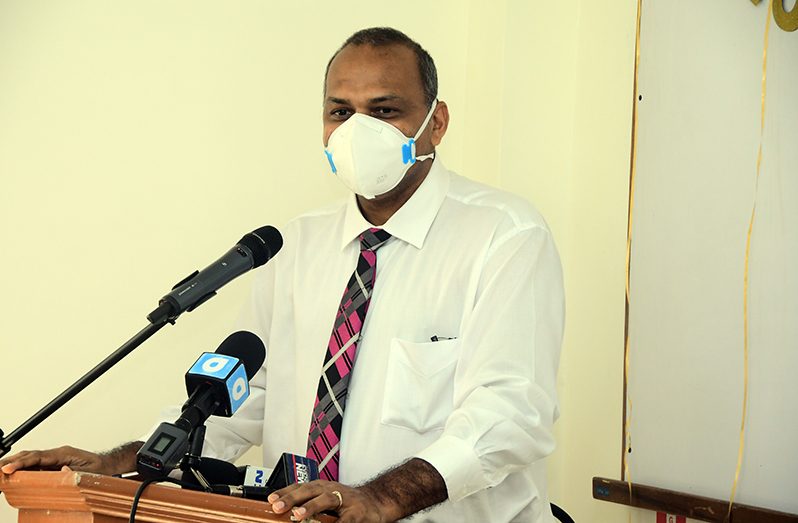— Health Minister affirms existing health protocols will prevent transmission
SAMPLES of the virus, COVID-19 that were collected from persons in Guyana have been sent to the Caribbean Public Health Agency (CARPHA), in Trinidad, for genomic sequencing in order to identify whether these samples are newer variants of the coronavirus.
CARPHA in collaboration with a team from the University of the West Indies (UWI), St. Augustine campus has been engaging in a type of genetic analysis, called genomic sequencing, to determine whether COVID-19 samples are the ‘normal’ strain or variants.
Health Minister, Dr. Frank Anthony has emphasised, on numerous occasions, that Guyana does not have the capacity to conclusively identify newer strains because the country is unable to perform genomic sequencing. But, he has not rejected the possibility that the strain(s) may be in Guyana.

“We have sent some samples to CARPHA during this week, and we’ll await the results from them,” Dr. Anthony said on Friday during his daily COVID-19 update, responding to a question asked by the Guyana Chronicle.
The minister related that it would take some time for the samples to be analysed and interpreted, and as of now, Guyana is awaiting results from CARPHA.
A new variant of COVID-19 was discovered in the United Kingdom (UK) late last year, after genomic sequencing was conducted on a number of samples. This variant is reportedly more transmissible but it does not seem to be more deadly.
The ‘UK variant’, called the B117, prompted many countries to institute bans on persons travelling from that country. In the Caribbean, Jamaica was among the few countries to institute such a ban but that country has since recorded four cases of the UK variant. On Thursday, CARPHA’s genomic sequencing revealed that one case of the UK variant was imported in Trinidad.
Variants have also been detected in South Africa and Brazil.
Existing information suggests that the variants are more transmissible, meaning that more persons can become infected. Investigations continue into whether any of the variants may be resistant to the vaccines being developed, some of which are already being administered.
EXISTING PROTOCOLS EFFECTIVE
Minister Anthony further explained that the transmission of the variants is, essentially, the same. The viruses can be spread through droplets and aerosols, and therefore, transmission can be prevented by wearing masks properly.
The development of variants, or strains, of viruses is not unusual. Scientists note that as viruses continue to evolve, mutations will occur. The Health Ministry explained that some of these mutations may be of little to no significance, but other mutations may be concerning.
The variants identified in the UK, South Africa and Brazil are all concerning mutations, due to their increased transmissibility. Future mutations may have a more severe, adverse effect on infected individuals. Vaccines may also be less effective.
“As the virus mutates and evolves, we’ll have to constantly do those sequencing and then compare it to see what is effective and not effective,” Dr. Anthony said.
In Guyana, Virology Laboratory Manager at Eureka, Paul Cheddie, recently told this newspaper that these “abnormalities”, which could be COVID-19 variants, were discovered following the lab’s use of three-gene-testing to test for three genes or targets associated with SARS-CoV-2, the virus that causes COVID-19.
These genes, Cheddie said, help to enable the COVID variants to bind to human cells, and, therefore, enter and infect the cells. He, however, highlighted that some variation has been identified since some samples have one less gene (that is, they have only two genes).




.png)









